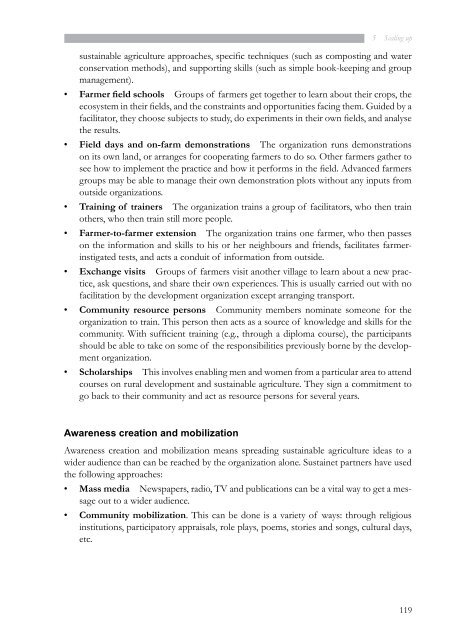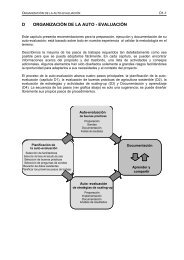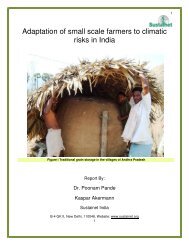cases from tanzania - Sustainet
cases from tanzania - Sustainet
cases from tanzania - Sustainet
Create successful ePaper yourself
Turn your PDF publications into a flip-book with our unique Google optimized e-Paper software.
5 Scaling up<br />
sustainable agriculture approaches, specific techniques (such as composting and water<br />
conservation methods), and supporting skills (such as simple book-keeping and group<br />
management).<br />
• Farmer field schools Groups of farmers get together to learn about their crops, the<br />
ecosystem in their fields, and the constraints and opportunities facing them. Guided by a<br />
facilitator, they choose subjects to study, do experiments in their own fields, and analyse<br />
the results.<br />
• Field days and on-farm demonstrations The organization runs demonstrations<br />
on its own land, or arranges for cooperating farmers to do so. Other farmers gather to<br />
see how to implement the practice and how it performs in the field. Advanced farmers<br />
groups may be able to manage their own demonstration plots without any inputs <strong>from</strong><br />
outside organizations.<br />
• Training of trainers The organization trains a group of facilitators, who then train<br />
others, who then train still more people.<br />
• Farmer-to-farmer extension The organization trains one farmer, who then passes<br />
on the information and skills to his or her neighbours and friends, facilitates farmerinstigated<br />
tests, and acts a conduit of information <strong>from</strong> outside.<br />
• Exchange visits Groups of farmers visit another village to learn about a new practice,<br />
ask questions, and share their own experiences. This is usually carried out with no<br />
facilitation by the development organization except arranging transport.<br />
• Community resource persons Community members nominate someone for the<br />
organization to train. This person then acts as a source of knowledge and skills for the<br />
community. With sufficient training (e.g., through a diploma course), the participants<br />
should be able to take on some of the responsibilities previously borne by the development<br />
organization.<br />
• Scholarships This involves enabling men and women <strong>from</strong> a particular area to attend<br />
courses on rural development and sustainable agriculture. They sign a commitment to<br />
go back to their community and act as resource persons for several years.<br />
Awareness creation and mobilization<br />
Awareness creation and mobilization means spreading sustainable agriculture ideas to a<br />
wider audience than can be reached by the organization alone. <strong>Sustainet</strong> partners have used<br />
the following approaches:<br />
• Mass media Newspapers, radio, TV and publications can be a vital way to get a message<br />
out to a wider audience.<br />
• Community mobilization. This can be done is a variety of ways: through religious<br />
institutions, participatory appraisals, role plays, poems, stories and songs, cultural days,<br />
etc.<br />
119




